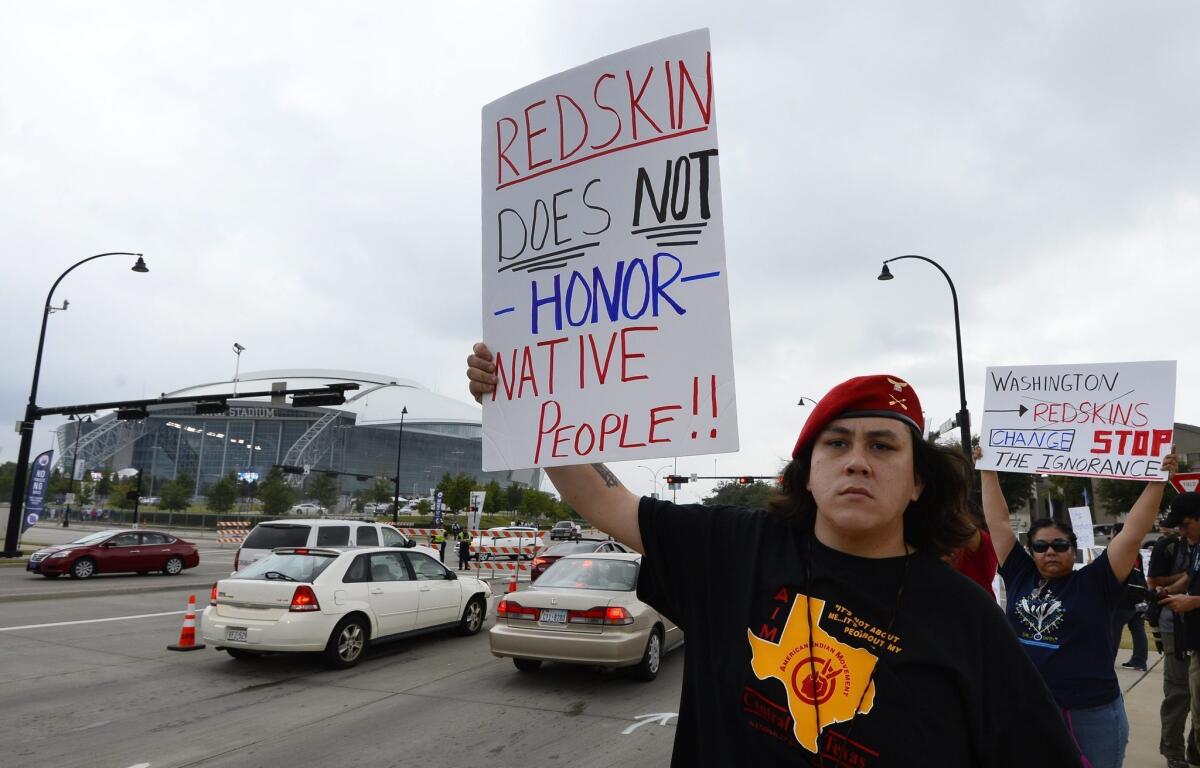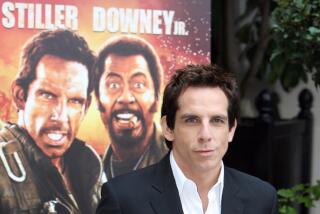Redskins: No harm, no foul, Mr. Costas

- Share via
“Think for a moment about the term ‘Redskins,’” NBC Sports commentator Bob Costas exhorted viewers during his halftime tirade of Sunday’s Cowboys-Redskins game. “Ask yourself what the equivalent would be, if directed [at] African Americans. Hispanics. Asians. Or members of any other ethnic group. When considered that way, ‘Redskins’ can’t possibly honor a heritage or a noble character trait, nor can it possibly be considered a neutral term.
“It is an insult, a slur, no matter how benign the present-day intent,” Costas continued.
This is ludicrous. I say this not as someone who has particular love for the Redskins or its name. I say this as a lover of words.
Words are magical things, routinely defying the sort of logic-chopping on display in Costas’ tirade. Their euphony can be a siren calling us to dangerous shores. Logophillic pundit William Safire, an unreconstructed paronomasiac, could be so seduced by clever puns, he often crashed whole columns into them. My former boss, William F. Buckley, was often in the dock on charges of aggravated sesquipedalianism, to which he always pleaded nolo contendere, informing the court of public opinion: “I am Lapidary But Not Eristic When I Use Big Words.”
But neither big words nor big wordplay are the issues in the largely eristic tussle over the Redskins. This debate is about bad words.
Slate magazine recently announced it would no longer refer to the Redskins by name. “Changing how you talk changes how you think,” Editor David Plotz explained. “...If Slate can do a small part to change the way people talk about the team, that will be enough.”
I hope Slate will be similarly brave about refusing to use the “C” in NAACP.
After all, the “Colored” in the National Assn. for the Advancement of Colored People refers to skin color too. And if I described the president of the NAA[initial redacted]P as “colored,” I’d be in huge trouble.
Redskins lawyer Lanny Davis insists the team’s 80-year-old name should be grandfathered in, even though he concedes that someone might be offended. Time’s Sean Gregory sarcastically responds: “So we have to be sensitive to the one offended person, but can’t change the name, because it’s been around for a long time. Sorry, offended person. We love the name too much, for too long.”
Well, yeah. I’m not offended by the C in NAACP — which isn’t racist for obvious reasons — but someone out there must be. That’s not an argument for changing the name. I am offended, however, that the Philadelphia Eagles are named after the Blue Eagle, the propaganda symbol of the New Deal’s National Recovery Administration, which restricted competition and even threw a dry cleaner in jail for charging too little to clean a suit. But I don’t think the Eagles should change their name on my account.
And that’s my problem with Costas’ crusade. He — and the editors of Slate — are simply deciding to be offended about something they don’t need to be. “Redskin” actually has quite innocuous origins. It was probably adopted from Native Americans themselves. And though it obviously took on nastier connotations over time and in some contexts, it strains credulity to believe that the team name was intentionally pejorative or that the fans or the ownership see it that way today.
Words become offensive when we choose to be offended by them. When should we be offended? That’s a tough question. “The answer, of course, lies in the context,” the late Hugh Rawson wrote in his lovely lexicon, “Wicked Words.” “The meanings of words change according to who says them, to whom, and in what circumstances.” Rawson chronicled many words that were uncontroversial in Chaucer and Shakespeare but are considered repellent today.
Ultimately, of course, this isn’t a fight about words but about cultural politics and the imperative to scrub society of all offensive language (or, often, merely language that offends liberals). That fight will never end, and not just because some people always need to be offended by something. It will never end because words themselves will never cooperate.
More to Read
A cure for the common opinion
Get thought-provoking perspectives with our weekly newsletter.
You may occasionally receive promotional content from the Los Angeles Times.











